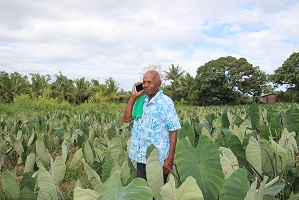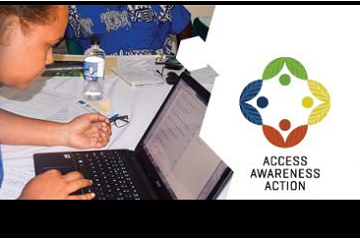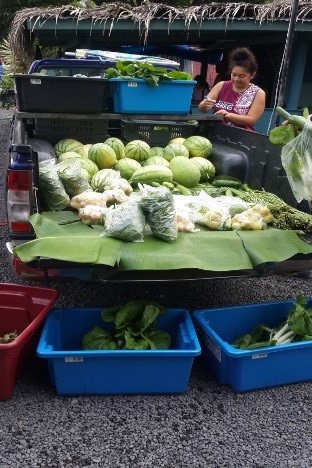E-agriculture builds capacity to effectively deliver ICT and knowledge products that provides access and accessibility to regional and national governments who are sharing/exchanging information.
E-agriculture increases evidence-based practices through the use of ICT solutions. As part of ongoing effort to make information accessible and available to national governments, SPC-EU Pacific Agriculture Policy has assisted in the development of a few e-agriculture products and initiatives. SPC PAPP continues to increase outreach and engagement to involved key stakeholders in agriculture policies, market access, value chains, sustainable agriculture, knowledge and management, agriculture information management etc. This will ensure that countries are fully aware of the e-agriculture initiatives implemented and supported by countries and how best each stakeholder can utilise, and contribute to, the usefulness of these initiatives.
Market Information System

PAPP carried out a two-pronged intervention to support operationalisation and expansion of the MIS during 2015-16. This included technical assistance to improve back-end system functionality, link with more local telecommunication providers, establish standardised procedures, setting up reporting mechanisms, and a membership outreach to increase the number of farmers registered on the system.
The FCLC MIS is most commonly used for sending bulk communications out to farmers, but also has a range of other complementary functions:mPrices - a market information system used to gather and distribute price data for a range of commodities;
- Agri Tips - a platform for FCLC or Partners to receive and answer questions regarding Crop or Livestock issues via SMS;
- Fiji Makete - a buyer-seller matchmaking platform;
- mPolling - a service where FCLC and Partners can send out polls to gather important information from farmers; and
- mAlerts - an easy way to send information alerts to groups of people, particularly in emergency situations.
Pacific Agriculture Policy Bank

Today the APBs covering fifteen countries enables online access - by anyone to key agricultural information; policies, commodity plans, statistics and the operations of Agricultural Ministries. The benefits are already immense; Nationally, there is raised awareness and more inclusive engagement and fostering complementary regional approaches for common commodities.
Agricultural Intelligence Information System
 November 2016 saw the finalisation of technical assistance from PAPP to the Cook Islands Ministry of Agriculture for the establishment of an Agricultural Intelligence System or AgINTEL for short.
November 2016 saw the finalisation of technical assistance from PAPP to the Cook Islands Ministry of Agriculture for the establishment of an Agricultural Intelligence System or AgINTEL for short.
Assistance for the AgINTEL was first provided in 2015. This was identified as a potential area for support following work done by the Ministry of Agriculture in partnership with the UN Food and Agriculture Organisation (FAO). A study on opportunities for import substitution supported by FAO recommended the establishment of a regular market survey and further information systems for anticipated demand for fruit and vegetables by hotels and retail outlets. In 2014 the Ministry established a market survey but with the commencement of PAPP they sought support for further development of the system.
Over the course of two years (2015-2016) PAPP provided technical assistance from an Agricultural Statistician and a Database Specialist to help them develop AgINTEL. The system established new surveys with enterprises and with farmers and bolstered the coverage of the market survey. It also established a database for combining the results of the various surveys. An innovative element of the database design was the use HS codes (codes normally used for trade of commodities) to be able to trace particular fruit, vegetables, herbs and spices from their production to their sale in the domestic market and to shops and resorts.
Once established, the Ministry of Agriculture implemented and tested the database until the technical assistance team returned in 2016 to review the system. The system designed was incredibly ambitious and the Ministry still have a long way to go to realise the vision of the AgINTEL, nevertheless, they are already experiencing significant benefits from the work. The Cook Islands Market Bulletins provide more information.
Pacific Agriculture Information Systems (PAIS)
 Agriculture research and extension is one of the key policy instruments available to support research and extension linkages on advisory services.
Agriculture research and extension is one of the key policy instruments available to support research and extension linkages on advisory services.
Providing access to relevant information and knowledge can promote or strengthen effective policies and assist in achieving key priorities. There’s increase demand for information and knowledge however organisations capacity to manage information effectively has been quite challenging. Storing key documents in a centralised repository makes it easier for organisations to quickly access information with just one click and respond to information needs of key stakeholders.
The PAIS is a centralised online and offline document repository that provides easy access to secure and reliable agriculture research documents and related materials. Go to PAIS online HERE.
The PAIS contains research documents available in digital format, including reports, research papers, conference papers, research and extension publication and other agriculture documents. To date, there’s more than 37,000 records of bibliographic documents.




CONNECT WITH US